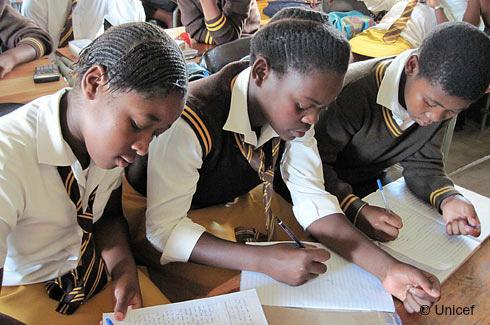Child support grant keeps sugar daddies away

 As part of the study, researchers interviewed 3 515 young people between the ages of ten and 18 years in two urban and two rural health districts in the Western Cape and Mpumalanga, and followed them up a year later.
As part of the study, researchers interviewed 3 515 young people between the ages of ten and 18 years in two urban and two rural health districts in the Western Cape and Mpumalanga, and followed them up a year later.
The research found that, while around 15 percent of teenagers were engaging in a risky sexual behaviour such as unprotected sex, multiple partners or sex while under the influence of drugs or alcohol, girls from families that received government’s R300 child support grant were less likely to have sex with older men, or “sugar daddies.”
The study also found that girls who said they slept with older men were also more likely to report having sex in exchange for money, school fees or transport.
These girls were also more likely to report having multiple partners, unprotected sex and having sex while drunk or high, according the research conducted by Oxford University in partnership with the universities of the Witwatersrand and KwaZulu-Natal.
“Child support grants do not make teenagers more sensible when it comes to safer sex,” said Mark Orkin, professor with the University of the Witwatersrand’s School of Public and Development Management and study co-author. “What they can do is promote enough financial security for girls that they do not have to choose their sexual partners through economic necessity.”
By allowing women to avoid relationships based on economic need with older men, South Africa’s child grant may be preventing new HIV infections, according to the study’s lead author Dr Lucie Cluver from the UK’s Oxford University.
“The study’s main message is very clear,” she said. “If we give child support grants or other cash transfers to families then we can reduce HIV risk among girls in those families.”
Sex between younger women and older men is one of the main drivers of HIV in South Africa, where HIV prevalence among girls between the ages of 15 and 19 is five times higher than that among their male peers, according to the latest Human Sciences Research Council household survey.
Cluver added the study, published in the international medical journal The Lancet Global Health, is a powerful reminder of young women’s vulnerability.
“There have been loads of stories in the media about sugar daddies and about how girls are choosing to do this…that it’s a kind of life style choice,” she told Health-e. “This data really suggests the opposite because it says that even if you give a relatively tiny amount of money to the family to put them just above the level of survival, then girls are choosing not to have sugar daddies.”
The study comes on the heels of a 2012 joint assessment of the child grant by government and the United Nations Children’s Fund that found that children receiving the grant were more likely have better early nutrition, complete more years of schooling and score higher in maths.
“We should be very proud of our child and foster child care support grants,” Cluver said. “They cost a lot of money but this study is really saying that the money is worth it when you consider what we are protecting teenagers and young people against.”
She added that with the child grant’s proven benefits, more needs to be done to reach the roughly 30 percent of children who need, but are not receiving the grant. – Health-e News Service.
Author
Republish this article
This work is licensed under a Creative Commons Attribution-NoDerivatives 4.0 International License.
Unless otherwise noted, you can republish our articles for free under a Creative Commons license. Here’s what you need to know:
You have to credit Health-e News. In the byline, we prefer “Author Name, Publication.” At the top of the text of your story, include a line that reads: “This story was originally published by Health-e News.” You must link the word “Health-e News” to the original URL of the story.
You must include all of the links from our story, including our newsletter sign up link.
If you use canonical metadata, please use the Health-e News URL. For more information about canonical metadata, click here.
You can’t edit our material, except to reflect relative changes in time, location and editorial style. (For example, “yesterday” can be changed to “last week”)
You have no rights to sell, license, syndicate, or otherwise represent yourself as the authorized owner of our material to any third parties. This means that you cannot actively publish or submit our work for syndication to third party platforms or apps like Apple News or Google News. Health-e News understands that publishers cannot fully control when certain third parties automatically summarise or crawl content from publishers’ own sites.
You can’t republish our material wholesale, or automatically; you need to select stories to be republished individually.
If you share republished stories on social media, we’d appreciate being tagged in your posts. You can find us on Twitter @HealthENews, Instagram @healthenews, and Facebook Health-e News Service.
You can grab HTML code for our stories easily. Click on the Creative Commons logo on our stories. You’ll find it with the other share buttons.
If you have any other questions, contact info@health-e.org.za.
Child support grant keeps sugar daddies away
by lauralopez, Health-e News
November 26, 2013



